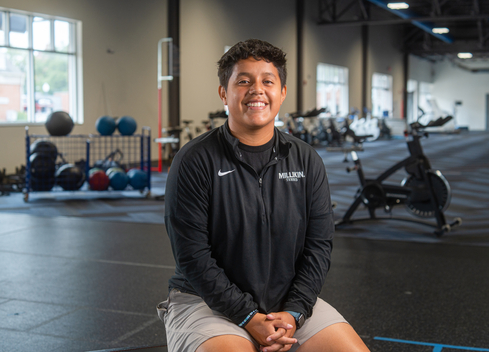Internship in Exercise Science This course is designed to provide opportunities outside the classroom to develop professional training and experiences specifically in the exercise science discipline. Internships are established in cooperation with agencies, businesses and institutions. Personal and Community Health This is an introductory course surveying topics and issues pertaining to the health/wellness classroom. Developing the wellness concept; physical, mental, social, emotional, environmental, and spiritual well-being are discussed. (ES160) Foundations & Theory of Health Behavior & Fitness Exercise science encompasses a growing number of subdisciplines, each aimed at integrating the unique demands of movement and the basic science associated with the subdisciplines. The aim of this course is for students to learn the introductory science and basic concepts of exercise, movement and healthy behaviors. Students will demonstrate knowledge of the requirements for career preparation in the major subdisciplines of health, fitness, athletic performance and recreation. (ES206) Prevention and Treatment of Athletic Injuries This is an introductory course emphasizing prevention and treatment of injuries particular to athletics and recreational activities. Rehabilitation procedures are included. (ES130) Growth & Motor Development Study of child, adolescent, and adult motor development will be the primary focus. Reference to similarities and differences in motor development through the lifespan of the individual will be emphasized. Secondary considerations of the cognitive, social, and emotional development will be included. Offered fall semester. (ES325) Kinesiology Anatomical understanding of the human body, with emphasis on biomechanics, origin, insertion, action, and innervation of the primary muscles used in human movement. (ES310) Health-Related Nutrition This course will explore the role of nutrition in physical fitness and health as professionals strive to promote optimal wellness. Fitness components, testing, and program design will be discussed. Nutritional concepts, nutrient function, and dietary considerations will be explored. (ES328) Organization & Administration This course focuses on the critical decisions and action steps that students must make in the planning, initiating, and sustaining new health and fitness ventures. The course uses experiential learning as the paradigm for engaging students in discovery and hypotheses testing of their personal business model. (ES335) Physiology of Exercise I This course provides a foundation of the cardiovascular, nervous, endocrine, and respiratory systems and health issues related to these systems. Emphasis is placed on the relationships between physical activity, exercise behavior, and the physiological adaptations to exercise as they relate to health and fitness. Also addressed are the rationale of exercise training programs for various sectors of the population and exercise prescriptions for healthy individuals and those with health risks. (ES305) Physiology of Exercise I Lab Taken in conjunction with ES 305. Through demonstration and laboratory experiences, students will gain skills needed to assess acute and chronic physiologically changes that occur in the body in response to exercise. (ES306) Biomechanics The study the physical principles and physics of the human body as it moves during activity, how the neuromuscular system controls human movement, and the mechanical principles that underlie musculoskeletal injury. (ES409) Physiology of Exercise II This course is designed to facilitate understanding in how the body reacts and adapts to exercise. Attention to the methods and principles of exercise testing is covered in detail. The course includes practical application of principles through laboratory experiences. Importance and purpose, physiological rationale, methodology, analysis and discussion of exercise, and the human body are all included. (ES410) Physiology of Exercise II Lab Taken in conjunction with ES410. For the lab part of this course, students will gain knowledge of the acute and chronic changes that physiologically occur in the body in response to exercise through demonstration and laboratory experiences. Course and lab cannot be taken independent of one another. (ES411) Principles of Strength and Conditioning This course will focus on the application of scientific principles towards developing safe and effective strength training programs designed to improve general health and physical performance in a variety of populations. Completion of this course will prepare students to take a national strength and conditioning certification exam. (ES418) Principles of Strength and Conditioning Lab Taken in conjunction with ES 418. For the lab part of this course, students will gain knowledge and practical experience in designing and implementing strength training programming through demonstration and laboratory experiences. (ES419) Principles of Personal Training This course will examine training strategies for personal fitness and athletic enhancement. Main topics will include applied anatomy and physiology, testing and evaluation, exercise techniques, and program design. Students who complete this course will have sufficient knowledge to pursue a certification as a personal trainer from accredited fitness organizations. (ES426) Principles of Personal Training Lab Taken in conjunction with ES 426. For the lab portion of this course, students will gain knowledge and skill in developing personal training programs that encompass all essential systems. (ES427) | 





